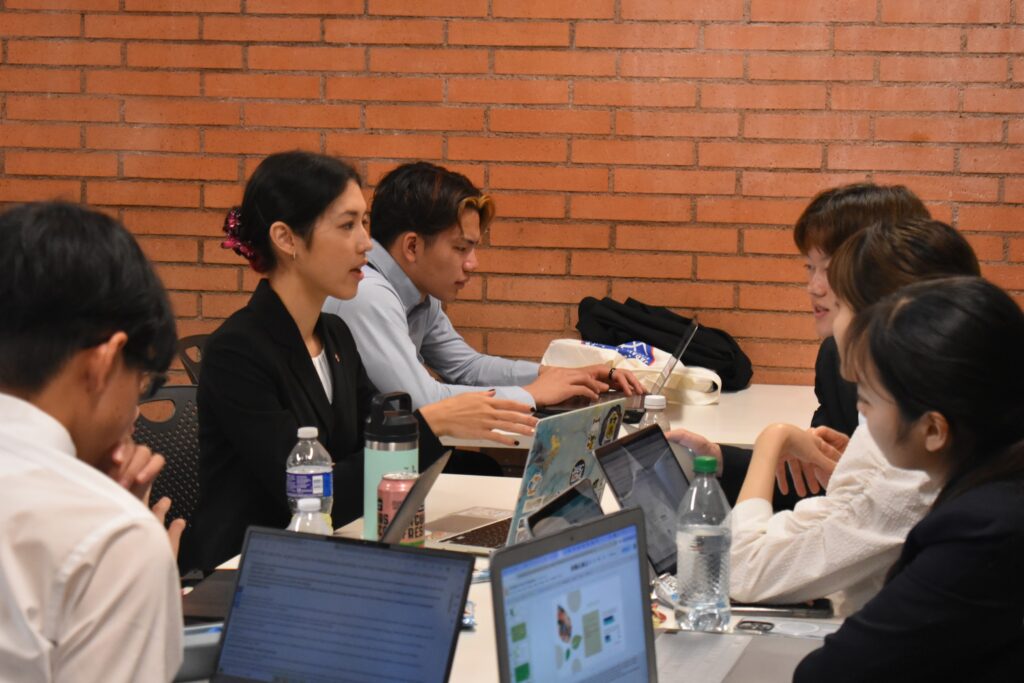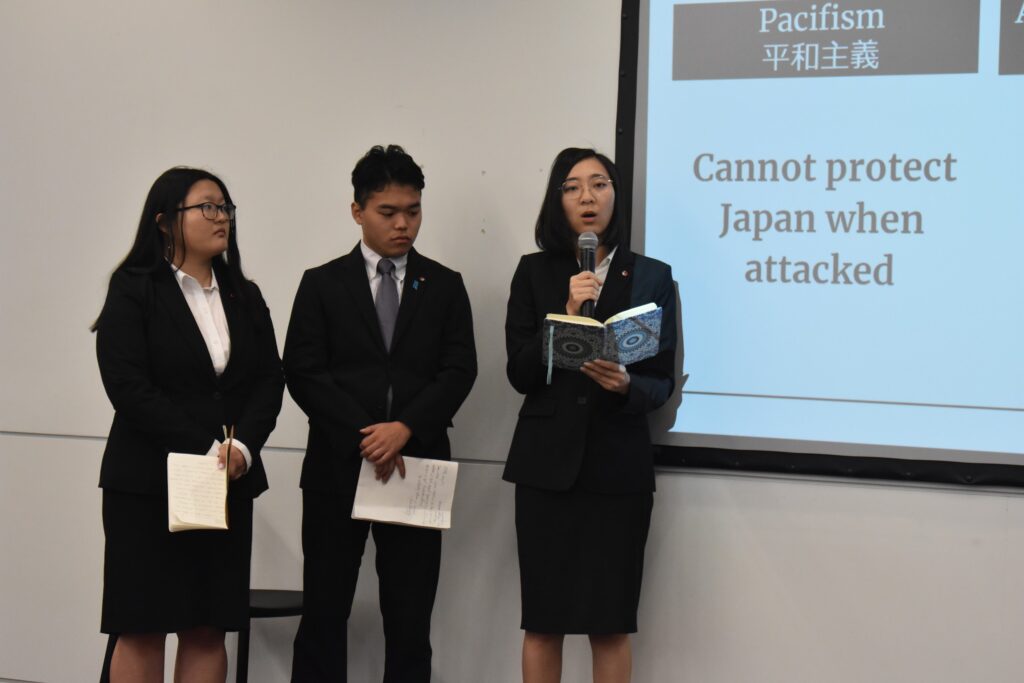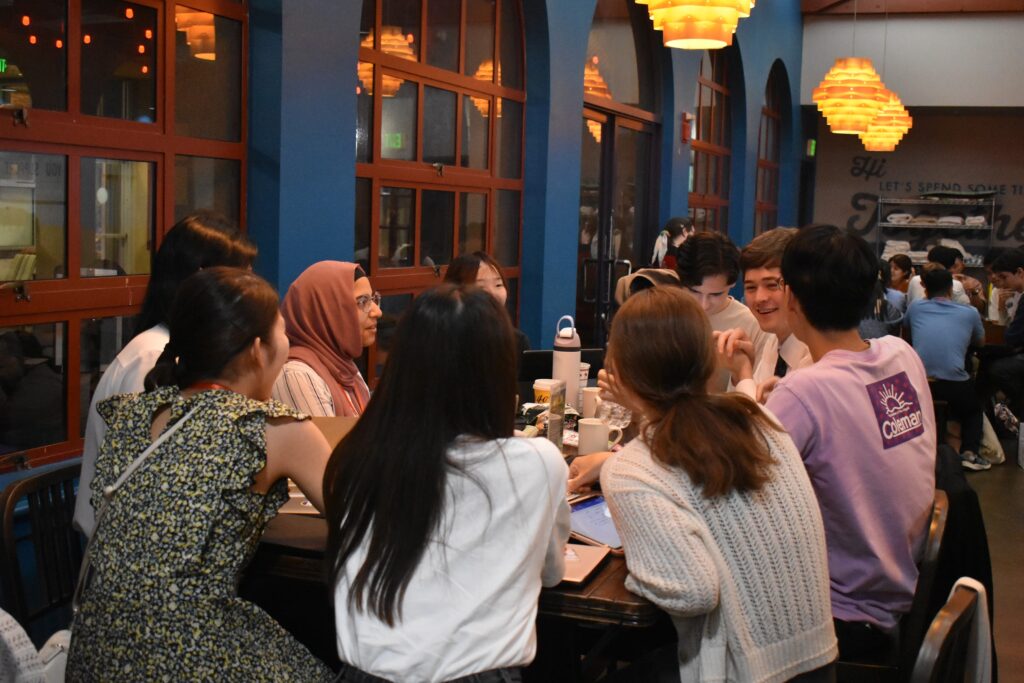What is a Roundtable?
The delegates are split into various Roundtables (RT) to further facilitate genuine discussion. Roundtables are themed academic discussion groups, evenly split with a few members from both the American and Japanese sides. While the topic of the Roundtable tailors discussion to the interests of the members, conversations and research are led by the delegates, with facilitation by Roundtable Leaders.
The primary goal of these groups is to provide delegates the opportunity to engage in open discussion and discover the varied perspectives of their peers. The RTs work together to create presentations for the various forums throughout the conference, notably the Final Forum. These presentations vary widely culminating in the diverse experiences, ideas, and education that each delegate possesses. Roundtables serve to allow the delegates to choose how they want to explore their interests while also exploring the benefits and challenges that come with bilateral communication.



The 77th JASC Roundtables
Japan-US Business Strategies
Led by Brandon (USA) and Ray (Japan)
Business strategies are an important component in many countries’ business realms, and they are a big factor that correlates to growth in production and innovation. Japan and the U.S. are powerful entities in terms of business strategies. Some common strategies that are used are competitive strategies, growth strategies, innovation, and acquisition. Due to successful business strategies, both Japan and the U.S. have many prospering businesses that are recognizable worldwide and generate wealth for their respective countries. It is up to the future entrepreneurs to view and discuss what strategies are in use, what were established in the past, and the reasons behind them, since it will foster new ways to improve upon the strategies and thus create success.
This roundtable will focus on business strategies being implemented currently or in the past by companies based in either Japan or the U.S. Viewing these strategies will allow for discussion on a wide range of topics which can include, a comparison between the two countries, the success rates of the strategy, the reason behind certain strategies, and what alternative strategies could have the companies done. The main goal of the roundtable is for delegates to analyze the business world and view what is working, and what needs fixing to spark innovation and strategies for the future success of the business world.
Food, Culture, and Society
Led by Andrew (USA) and Hanon (Japan)
“One cannot think well, love well, sleep well, if one has not dined well.” Virginia Woolf. This roundtable will explore the subject of food in relation to culture and society. Eating unites us on a daily basis, yet the specific foods we consume distinguish us from one another. At the heart of any dish, there is a legacy of traditions, memories, and shared history, reflecting the values and identities of the people who create and consume it. As each individual food story is unique, we’d love to hear what’s on your plate.
Food will also serve to achieve greater cultural understanding between the US and Japan, transcending the superficial dichotomy of Big Macs and glizzies vs ramen and sushi. Discussion will begin with your personal food experiences, and by moving beyond boring stereotypes, we aim to enrich our collective understanding of each other’s culinary heritages and cultural values.
Furthermore, while many of us are blessed with culinary choices like never before, social issues ranging from health and wellness to food insecurity and globalization of food cultures are significant and cannot go ignored. Your unique insights on these issues will contribute to deeper dialogue about how our food choices tie into societal dynamics and the importance of addressing these challenges.
Environmental Innovation and Entrepreneurship
Led by Emile (USA) and Masahito (Japan)
As the world faces the growing threat of global warming, various countries have convened to solve the environmental crisis. International organizations encourage the world to follow the Paris Agreement’s goal of net zero global emissions by 2050. Although countries struggle to agree on impact limitation and resource sharing, entrepreneurs continue to find innovative solutions to the world’s most pressing problems.
These actors are changing our response to climate change through innovative ideas fueled by evolving technology. Financial markets that fuel entrepreneurship, such as venture capital, shifted to accommodate this boom in environmental technology. Through innovative technologies, entrepreneurs strive to further sustainable solutions. The initial wave of significant investments in climate tech that emerged from Silicon Valley in the early 2000s may have waned, but recent investments in Envirotech have soared due to a renewed interest in environmental technology. Entrepreneurs are now tasked with pioneering new approaches to growing and scaling their products, ushering in an era of innovation.
In the US and Japan, developing an idea into a profitable and sustainable company proves difficult. What role can environmental entrepreneurs play in the private sector? How can entrepreneurs achieve both social impact and secure profits? Through this conference, we hope to explore the role, challenges, and prospects of entrepreneurs in the context of shifting political demands for environmental technology.
Technology, Ethics, and Happiness
Led by Mao (USA) and Haruka (Japan)
Albert Einstein once posed: “Why does this magnificent applied science, which saves work and makes life easier, bring us so little happiness? The simple answer is: because we have not yet learned to make sensible use of it.” In recent years, rapid advancements in scientific technology—such as Artificial Intelligence, CRISPR, and blockchain—have significantly augmented our capacity to address physical and environmental challenges. However, these innovations also carry profound societal and moral implications. As technology becomes increasingly woven into our lives, issues such as privacy invasion, escalating inequality, and environmental degradation pose substantial threats to rights and justice. Echoing Einstein’s insight, it is imperative that we learn to wield these tools responsibly for the collective benefit of society and individuals.
In this context, the urgency of ethical considerations and collaborative efforts—both among scientists and policymakers and between nations such as Japan and the US—cannot be overstated. Our roundtable discussion aims to delve into the ethical dilemmas and explore pathways to a just society through technology from diverse perspectives. Our mission is to ensure that technological advancements are not only beneficial and sustainable but also enhance human well-being. We invite students from all disciplines to engage with these complex issues, drawing on their knowledge and experiences in pursuit of meaningful solutions.
Means and Meanings of Communication
Led by Amy (USA) and Shiho (Japan)
Communication occupies a significant part in our social life. At the very beginning of our human history, people drew signs, used gestures, made sounds, etc. The development of writing systems has given rise to various literary forms, such as poetry, essays, and fictions. In modern times, technological development has brought both improvements and challenges to the traditional ways of communication. Social media platforms have tightened the relations between individuals and their society by overcoming the limitation of time and space. However, the flood of information on these platforms has become overwhelming. Furthermore, translation apps and Generative AI have, somehow, demonstrated their potential in enabling us to cross language barriers, but does it mean true communication? To initiate dialogues that allow the existence of different perspectives and contribute to a mutual understanding keeps being a challenging task. As global citizens, it is also important to consider how the current mechanism of communication might work differently for various social groups, such as gender, race, and ethnic minorities.
In a word, by discussing how and why we communicate, this RT aims to explore the evolving relations between self and society, and how future ways of communication could correspond to our ever-changing human needs.
Aesthetics in Design and Media
Led by Rachel (USA) and Masato (Japan)
The forms of the pursuit of “truth, goodness, and beauty,” which have been emphasized differently across eras and cultures, continue to change in modernity alongside the development of a materially fulfilled consumer society. The truth often becomes obscured due to the dissemination of information on social media. The definition of goodness is based on not only religious values but also societal and ethical values. Beauty standards have transformed due to commercialism and technology.
Delegates will be focusing on the exploration of this “aesthetic inquiry” in Japan and the United States and understanding each other’s cultural backgrounds is essential for removing stereotypes and promoting deeper mutual understanding. This roundtable will focus on the exploration of aesthetics as reflected in design and media, such as the arts, fashion, film, and social media, which significantly contribute to the formation of cross-cultural recognition in both countries. Additionally, it aims to cultivate cultural sensitivity, which serves as a tool for objectively surveying the coexistence and conflict of cultures and promoting global cultural exchange.
International Politics in the Indo-Pacific
Led by Hudson (USA) and Tomoki (Japan)
The modern Japan-US relationship consists of complex political, economic, and military dynamics, which must be understood not only on their own, but also in the context of East Asia, the Indo-Pacific, and the global stage. Japan and especially the US have ever changing domestic political situations which affect each nation’s stances on various interests and issues. The diplomatic systems through which nations communicate are also heavily influential. Economic security is threatened as trade barriers and tariffs continue to rise globally, and the global economy becomes increasingly reliant on Taiwan’s semiconductor manufacturing while Taiwan’s sovereignty is threatened by Chinese aggression. This is intertwined with the Japan-US military relationship, as some American political factions seek to reconsider America’s military role in East Asia, and American military presence in Japan and Japan’s own expansion of capabilities continue to cause controversy. Access to and the cost of energy, as well as the environmental costs of obtaining it, are also ever important. As these issues are considered in relation to East Asia, we must also understand the impacts of other nations in the Indo-Pacific, including Southeast Asia, the Indonesian Archipelago, and the emerging economies of the Indian Subcontinent.